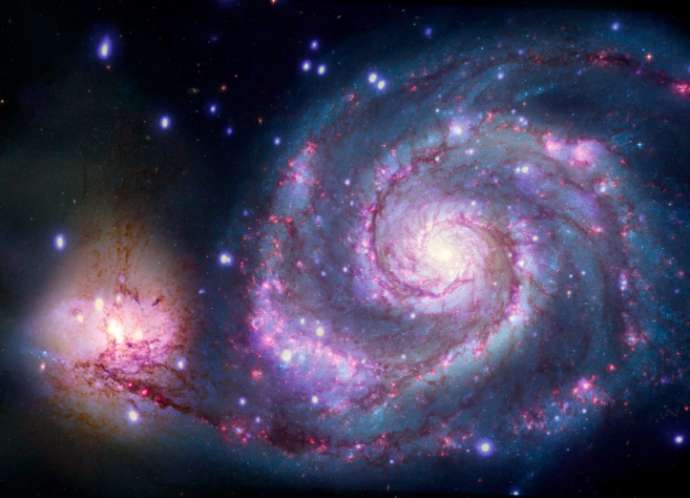Časoris is an online newspaper aimed at children. Each week we’ll take an article and post it here as a Slovene-English dual text.
Znanstveniki so zunaj naše galaksije morda odkrili nov planet
Scientists may have discovered a new planet outside our galaxy
Written by Dora Adamič, translated by JL Flanner & G Translate
Vesolje je ogromno in veliko je predelov, ki jih ne poznamo.
The universe is huge and there are many things we don’t know about.
Astronome zato neizmerno razveseli, ko najdejo kakšen nov planet ali zvezdo.
Astronomers are therefore immensely delighted when they find a new planet or star.
Nasini znanstveniki so morda zaznali prvi planet zunaj naše galaksije. Velik naj bi bil približno kot Saturn.
NASA scientists may have detected the first planet outside our galaxy. It is supposed to be about as big as Saturn.
Do sedaj so zunaj našega osončja odkrili približno pet tisoč planetov, a so se vsi nahajali v naši galaksiji. To pomeni, da so od nas oddaljeni do tri tisoč svetlobnih let.
So far, about five thousand planets have been discovered outside our solar system, but they were all located in our galaxy. This means that they are up to three thousand light years away from us.
Morebitni novi planet so odkrili v sosednji galaksiji, oddaljeni kar 28 milijonov svetlobnih let.
A possible new planet has been discovered in a neighbouring galaxy 28 million light-years away.
»Okrog 80 odstotkov potrjenih planetov zunaj našega osončja je bilo odkritih z metodo opazovanja prehoda planeta preko zvezdine ploskvice. Planet, ki kroži okrog zvezde, jo začasno delno zastre, s teleskopi takrat zaznamo potemnitev zvezde,« pojasnjuje dr. Dunja Fabjan s Fakultete za matematiko in fiziko.
“About 80 percent of the confirmed planets outside our solar system have been discovered by the method of observing the passage of the planet across the surface of a star. The planet orbiting the star temporarily partially obscures it, with telescopes we then detect the darkening of the star, "explains Dr. Dunja Fabjan from the Faculty of Mathematics and Physics.
»Sedaj pa so prvič opazovali začasno zmanjšanje količine rentgenske svetlobe, ki izhaja z manjšega območja te posebne dvojne zvezde.«
"Now, for the first time, they have observed a temporary decrease in the amount of X-rays emanating from a smaller area of this particular binary star."
Pri opazovanju planetov zunaj naše galaksije z zaznavanjem vidne svetlobe ne morejo razločiti posamičnih zvezd, ker so vse tako svetle.
When observing planets outside our galaxy by perceiving visible light, they cannot distinguish individual stars because they are all so bright.
»Zvezde, ki oddajajo rentgenske žarke, so redkejše, zato jih lažje opazujemo,« dodaja Dunja Fabjan. »Če oddajajo dovolj močna valovanja, postanejo dobra tarča za iskanje planetov okoli njih.«
"Stars that emit X-rays are rarer, so they are easier to observe," adds Dunja Fabjan. "If they emit strong enough waves, they become a good target for finding planets around them."
Znanstveniki še niso mogli potrditi, da gre zares za prvi planet zunaj naše galaksije.
Scientists have not yet been able to confirm that this is indeed the first planet outside our galaxy.
Potrebovali bi več podatkov, da se bolje prepričajo, a novih meritev še dolgo ne bodo mogli izvesti, saj bo planet potreboval sedemdeset let, da bo zopet zasenčil svojo zvezdo.
They would need more data to be better convinced, but they will not be able to make new measurements for a long time, as the planet will need seventy years to make a shadow on its star again.
Read more stories and improve your Slovene at Časoris, while all our dual texts can be found here. You can read more about this story at NASA






